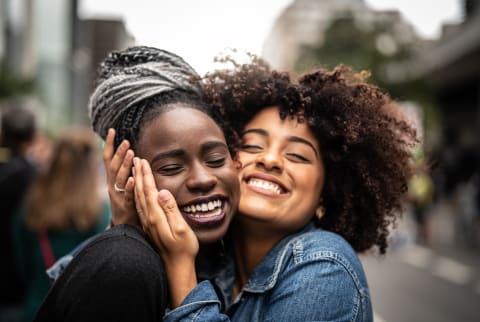Fortunately, researchers have spent decades turning an inquisitive eye to the fine art of making friends, and the science has yielded some pretty fascinating results about what matters most when it comes to creating bonds that last. “The friendships we’ve built aren’t random; they reflect our internal hardware, our ability to develop certain characteristics that nurture friendship,” Franco writes. “These are a set of mindsets and behaviors that we’d naturally gravitate toward if we weren’t so wounded by past experiences of disconnection, so afraid of rejection, so fearful or mistrusting of others, and, consequently, so out of touch with our inner core of love.” Here are just a few of the most game-changing secrets of friendship that she shares: She points to a 2009 study published in the 1Journal of Social and Personal Relationships1 wherein a group of older adults were asked whether they believed friends were made based on effort versus those who believed they were based on luck. The findings? People who believe friendships were based on luck tended to be lonelier and participate less socially five years later, whereas those who thought friendship took effort actually went ahead and put in that effort. Five years later, these people were more socially engaged and less lonely. “Believing that friendships happen organically—that the cosmic energies will bestow a friend upon you—actually hinders people from making friends because it stops them from being intentional about doing so,” Franco explains. If you want to make more friends, you’ll need to be active about taking initiative, she says—whether that means asking that cool co-worker out to coffee, joining a recreational sports league or community group, enrolling in a course, or just reaching out to an old friend you haven’t spoken to in a while who you’d like to reconnect with. Franco calls it “unapologetic initiative”—don’t be shy to admit you want to expand your circle and forge new bonds. That intentionality will pay dividends in the long run. Why? Take a classic 1990 experiment2 in which four strangers were secretly planted in a psychology class at the University of Pittsburgh. One snuck into 15 class sessions, another 10, another five, and the last zero, but in all sessions, none of them interacted with any of the actual students. Well, when the students were later asked how much they liked each of these people, they reported liking the stranger who showed up to the highest number of classes the most. “In the psychology world, this is called the ‘mere exposure effect’ since through merely being exposed to someone continuously, we come to like them,” Franco explains. Familiarity increases likability. So, if you want to nurture a budding friendship, keep showing up—because the more someone sees and interacts with you, the more they’re likely to like you over time. In fact, being likable is something you can basically will into existence. How? By simply assuming people will like you. Franco cites a study in the 3Personality and Social Psychology Bulletin3 that discovered this so-called acceptance prophecy effect. That study found that people who assume others will like them tend to be right. Moreover, when people expect others will accept them, they naturally behave in a way that’s more friendly, open, and agreeable. When you go in with more confidence and less anxiety about how people will perceive you, you’re more likely to behave in ways that people do, in fact, enjoy. “This assumption not only makes us more likely to take initiative but to navigate the friendship-making process, and life, with more peace, levity, and pleasure,” Franco writes. Just like it can be scary to fall in love with someone and to not know if you’ll be truly accepted or if your needs will truly be met in the relationship, the process of embarking on a friendship with someone can be weighed down with just as many underlying fears, many of which can be traced back to past experiences of relational pain or rejection. Franco points to a concept in psychology known as “risk regulation theory,” which holds that people first need to feel confident in another person’s positive feelings toward them before they’re willing to risk connecting with and depending on them. Makes sense, right? “To invest in a relationship, we need proof we won’t be rejected when doing so,” Franco explains. “Similarly, if we want people to invest in us, we need to make them feel safe to.” One key way to help make our potential friends feel more safe to get close to us—and to mitigate that fear of rejection—is to be abundantly affectionate with our friends, she says. For example: complimenting them openly, telling them you’re happy to hear from them, greeting them warmly when you see each other, or smiling at them genuinely. “We grant this security when we show affection. We impart that we love, value, and accept someone so they can feel safe to take the risks of intimacy with us,” she writes. As Franco puts it, “This is how we make friends as an adult. We grow—we become braver, more empathetic, kinder, more honest, more expressive.” With her warm, playful approach to coaching and facilitation, Kelly creates refreshingly candid spaces for processing and healing challenges around dating, sexuality, identity, body image, and relationships. She’s particularly enthusiastic about helping softhearted women get re-energized around the dating experience and find joy in the process of connecting with others. She believes relationships should be easy—and that, with room for self-reflection and the right toolkit, they can be. You can stay in the loop about her latest programs, gatherings, and other projects through her newsletter: kellygonsalves.com/newsletter



